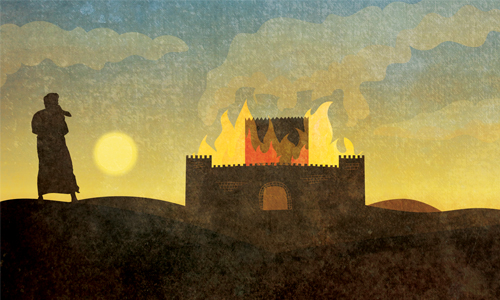Judah's "Good Luck Charm"
As we look at Jeremiah as a whole we see a number of different narratives that play out, and a number of different sins that are to be judged, but the over arching theme of the book is a theme of judgement.
If we were to look for somewhere to find this theme in all of its glory, we need look no farther that chapter 7. It is here that we can find every hope that the people of Judah had dashed to pieces like a piece of china on a tile floor.
It is chapter 7 that really sets the tone for the entire book when Jeremiah gives not a ‘feel-good’ sermon, but a sermon of coming judgement.
One of the main issues that Judah had against them could almost be considered was a problem that would haunt the Pharisees in the gospels. They thought that their religion was enough even without the fruits of religion. It is the same religion that the New Testament writer of James, would call worthless. (James 1:26)
Judah had even got steps beyond this treating the Temple as some type of ‘good luck charm’, believing that it would somehow insulate them from the judgement of God despite their sins.(1)
This mindset smacks of the account in of Eli’s generation and their handling of the Ark of the Covenant. (1 Samuel 4) Just as God had done in Eli’s day by removing the Ark from the presence of Israel, Jerimiah was to prophecy that it would this time be Israel removed from the temple.(2) Judah who expected to find asylum from God’s judgment among the temple, while they gave no asylum to the weak and poor among them.
Up to this point, following the history of God’s people, we can see that the times in which God is ready to pour out His judgement, He has allowed an intercessor to pray for the people and turn away His anger towards their sinfulness.(3)
However, this in not the case in Jeremiah’s day, it is too late. The Lord directly tells Jeremiah that he is not to pray for this people to be spared from what is coming. (Jeremiah 7:16) This was a judgement in itself, not only was judgement coming, but they were even being judged by the removal of an intercessor.
Even though they blatantly disobeyed the commands of God, rejected the poor and needy around them, and committed idolatry in the city of “their” God, the people of Judah continued to offer sacrifice just in case. They had completely missed the point of the sacrifices altogether, and like King Saul before them had placed them before obedience on the on a layer below sacrifice, assuming that it would cover any disobedience. (1 Samuel 15:22)
Jeremiah’s sermon in chapter 7 ends with the words of the Lord to Jeremiah. God tells Jeremiah that his will be treated no differently that the prophets before him, but that his message is to remain the same. Rebuke for sin and preparation for judgement.(4)
________________________________________________________________________
1 Chisholm, Robert, Handbook on the Prophets (Baker Academic, 2002), p. 165.
2 Ibid. p. 165.
3 Ibid. p. 165.
4 Ibid. p. 166.





Comments
Post a Comment